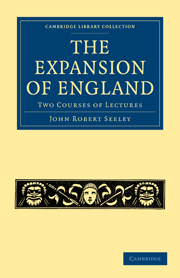Book contents
LECTURE VI - PHASES IN THE CONQUEST OF INDIA
Published online by Cambridge University Press: 05 August 2011
Summary
The sum of what I have laid before you up to this point is that in India a result has been produced by causes less wonderful than is commonly supposed, which result is in magnitude more wonderful, and in the consequences which may possibly flow from it far more wonderful and great, than is imagined. But in showing how such a result could be produced without a miracle I have laid stress upon another peculiarity of this Empire which is of fundamental importance, namely the slightness of the machinery which connects it with England. Let us now remark that in this respect our Indian Empire resembles our colonies. There is of course this vast difference that our chief colonies determine in most matters their own policy through Governments which spring up by a constitutional process out of the colonial assembly, and that India has no such independent initiative, the Viceroy himself being liable to be overruled by the Indian Secretary at home. But at the same time there is this great resemblance, that India, like the colonies, has been held at arm's length, that its Government has never been suffered to approach the Home Government so closely as to blend with it, or to modify its character, or to hamper its independent development. India is both constitutionally and financially an independent Empire. If the Empire of the Great Mogul had continued in its original vigour up to the present time, no doubt in foreign affairs the history of England would differ considerably from what it is.
- Type
- Chapter
- Information
- The Expansion of EnglandTwo Courses of Lectures, pp. 254 - 272Publisher: Cambridge University PressPrint publication year: 2010First published in: 1883

